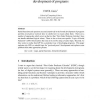Free Online Productivity Tools
i2Speak
i2Symbol
i2OCR
iTex2Img
iWeb2Print
iWeb2Shot
i2Type
iPdf2Split
iPdf2Merge
i2Bopomofo
i2Arabic
i2Style
i2Image
i2PDF
iLatex2Rtf
Sci2ools
109
click to vote
ENTCS
2006
2006
Reasoning About Partial Functions in the Formal Development of Programs
Partial functions and operators are used extensively in the formal development of programs and thus development methods have to clarify how to reason about them. There are a number of approaches which cover up the fact that "First Order Predicate Calculus" does not handle undefined logical values. There is also at least one specific "Logic of Partial Functions" (LPF) which tackles the issue at its root by using a weaker logic. Recently, we have come to realise that LPF fits a particular way of developing programs. This paper explains why LPF is a suitable logic for "posit and prove" development and explores some problems that other approaches present. Key words: Logic, partial functions, formal development
Related Content
| Added | 12 Dec 2010 |
| Updated | 12 Dec 2010 |
| Type | Journal |
| Year | 2006 |
| Where | ENTCS |
| Authors | Cliff B. Jones |
Comments (0)

